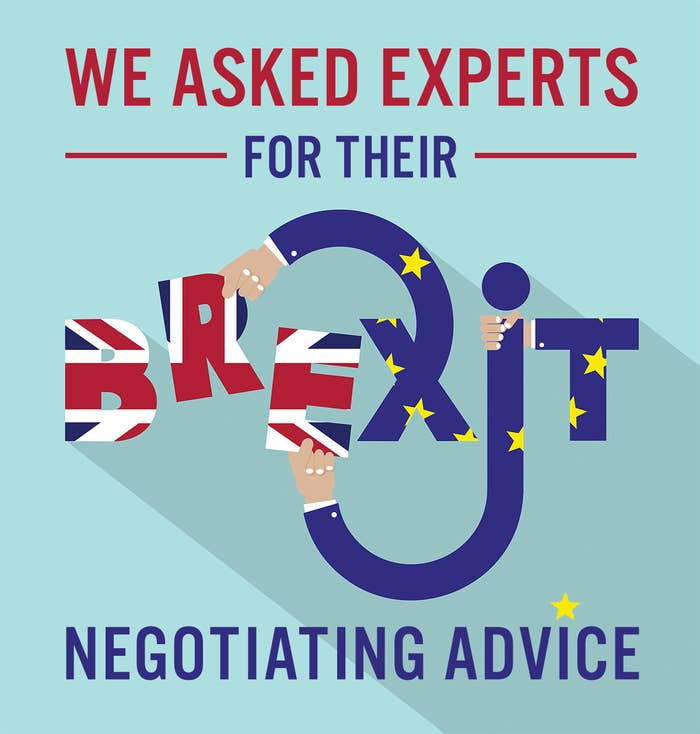
As Britain gears up to start negotiating its exit from the European Union, we asked some academics what advice they have for getting the most out of negotiations.
Connson C. Locke, senior lecturer in practice at the London School of Economics:
"A counterintuitive but important point is that negotiation is not a competition where one party has to lose in order for the other to win. That is a simplistic way of approaching negotiations and often results in both parties leaving the table unhappy. A negotiation is a joint decision-making process that can result in win-win solutions – but only if negotiators are skilled enough to identify issues and interests that can be traded off. Negotiation requires not only good communication but also a certain degree of creativity in order to discover these opportunities."
Adam Galinsky, professor of business at Columbia Business School:
"One piece of advice: Make the first offer! Over the past two decades my colleagues and I have conducted dozens of studies and have come up with important and straightforward conclusions. Many people fear that making the first offer is a mistake – and it is true that moving first can be disadvantageous when the other side has more information than you do. But, armed with knowledge about the other side and the topic being negotiated, the research is crystal-clear: Make the first offer and make it ambitious – this way you anchor the negotiation in your favour. So be first and bold, Britain, as you sail around the world negotiating and negotiating new agreements."

Gillian Ku, associate professor of organisational behaviour at London Business School:
"Successful negotiators need to consider others’ perspective, to move beyond placidly accepting what others are saying they want to actively examining what their underlying interests are. Although this focus on core motivations is basic and key to all negotiations, it is going to be particularly important for the Brexit negotiations given the number of diverse parties involved, the disparate viewpoints involved, and the overall complexity of the negotiations. Thus, Brexit negotiators should try to walk a mile in their counterparties’ shoes and consider what is driving their demands. Doing so will allow negotiators to grow the proverbial pie and claim a share of said pie."
Simon Usherwood, reader in politics at the University of Surrey:
"The most important thing in any negotiation is your BATNA (Best Alternative to a Negotiated Agreement), basically the most you can achieve if you walk away. If that BATNA is strong, then you have more power to get others to give you concessions, because you can realistically say that you have other options. But in the case of Brexit, the UK’s BATNA looks rather weak, not least because of the complexities of agreeing other trade deals with the rest of the world. Given that other EU member states know this, Theresa May risks having her bluff called in Article 50 negotiations, leaving her (and the UK) with less than she could have got."

Barry Goldman, associate professor of management and organisations at the University of Arizona:
"Part of choosing the best approach in negotiations is to understand the frame, or perspective, that may provide the most leverage. By deliberately choosing a frame, it encourages the negotiation partner to view an agreement in a way favourable to you. One of the most well-known frames relates to different views of risk and is based on prospect theory, created by Daniel Kahneman (for which he won the Nobel Prize) and Amos Tversky. They reported that people are much more likely to engage in risk if a situation is framed as a loss situation (e.g. how people are made worse off); however, if the same situation is framed as a gain (e.g. how people are made better off) people become much more risk-averse.
"The list of frames is endless, limited only by the creativity of the negotiators. Some other well-known frames in negotiation are long-term, short-term, emphasising the relationship, emphasising the outcome, or the scarcity of resources. Depending on the context and personnel in a particular negotiation, the choice of each of various frames can affect your partner's view of the particular negotiation. In terms of Brexit, it may behoove negotiators for the UK to emphasis the long-term benefits to accrue to the EU rather than the short-term approach that some EU members seem to be emphasising."
Ed Wertheim, professor at Northeastern University, Boston:
"The Brexit negotiations will generate many examples of 'anchoring' – a powerful force in negotiations. The Brexit discussions, like most negotiations, will result in compromises. The stronger (and more credibly) one anchors, the more likely the compromises will result in one’s favour. Also, the more extremely one anchors, the more ability one has to look 'reasonable' when making small concessions. The Brexit vote itself sets a strong anchor and may make it easier to gain concessions from negotiating partners. Of course, it has to be credible; if the other side considers it a bluff, the result can be bad for everyone."
